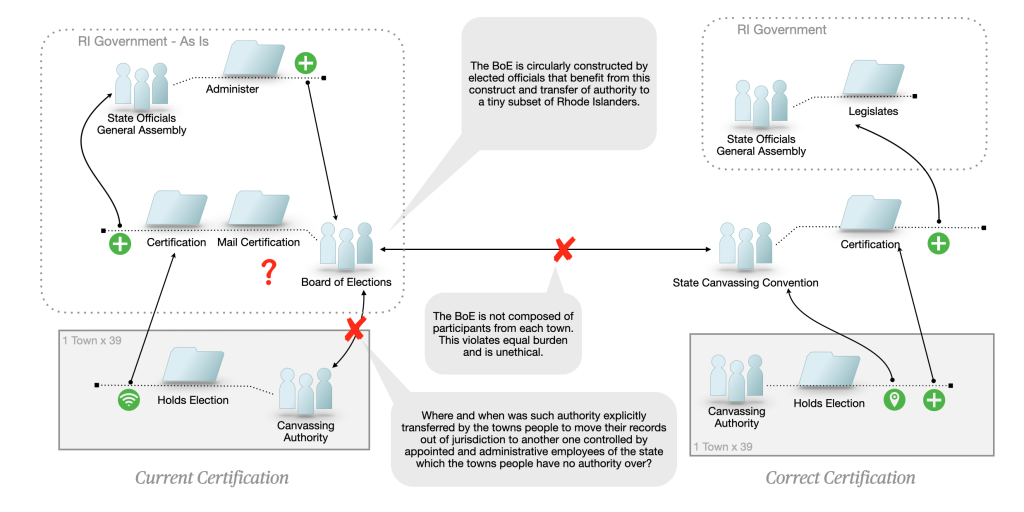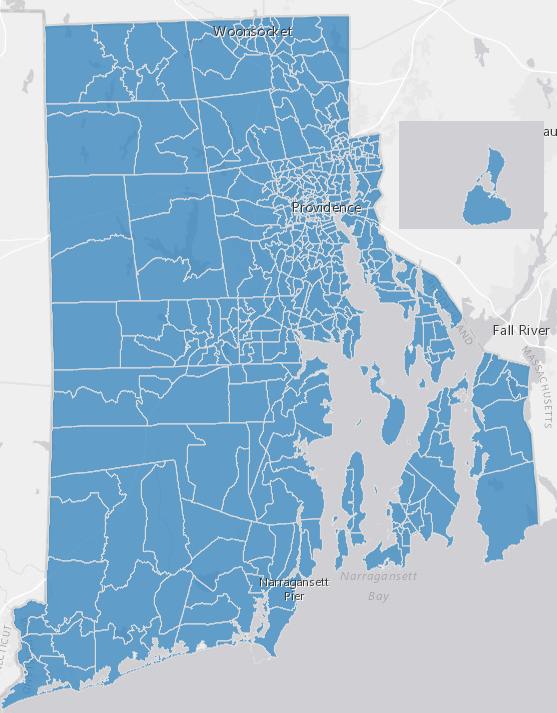The Problem
The current problem with elections oversight is that as a legally binding delegation process it unequally burdens numerous individuals as well as the electorate. The original colonial Rhode Island towns constructed/incorporated the state body, but this bottom-up construction has been incrementally inverted by elected officials into top-down control. It has become terribly circular as illustrated below.

The RI Secretary of State’s offices and the RI Board of Elections (appointed state officials and their hires) now control practically all aspects of elections including the non-sensical notion of auditing their own efforts. This renders audits and their certifications meaningless. Since a substitutionary certificate represents a thoroughly tested and true body of evidence, this is the logical equivalent of appealing to their own authority – “Trust me cause I say so.” Only the People can be the final judges of our collective consent. How do we fix this conundrum?
Secure, Authentic, Fair and Equal (SAFE) elections so all Rhode Islanders can be confident their voices are accurately heard in their self-governance.
RI CASE Mission
A Three Step Solution
1. Return absentee ballot processing to the 39 town canvassing boards
The first step is to eliminate the unequal burden held by the RI Board of Elections for absentee ballot processing. Within each town precinct/polling location, absentee paper ballots would be merged only on the day of election. One should not be able to distinguish between absentee-cast ballots and poll-cast ballots. All must use the same exact casting and witnessing method. This ensures complete handling and subjection to review by electors from their respective towns without relying upon evidence that is never publicly presented (such as signature verification).
2. Convene all Town Canvassing Authorities to summarize state election totals.
Since the RI Board of Elections (BoE) is to be completely impartial (as a state entity), it falls upon all 39 town canvassing boards and current election workers to prepare and tally results for all election contests and questions presented to their electors within their fixed jurisdictional borders. They would then convene to complete the tallies for contests that overlap between towns. This restores the RI BoE to an impartial arbitration panel between the town canvassing authorities, rather than a highly conflicted, overly burdened state administrator and director in charge of elections and a ballot processing participant. Once town tallies have been certified, then a full forensic audit of all state-wide impacting results is automatically triggered. This ensures fully distributed equal burden.
3. Create a Convention to Authenticate/Audit the State Election (CASE)
Constitutionally Authorized State Electors (CASE) then temporarily Convene to Authenticate/Audit the State Election (CASE) results. CASE delegates are determined by a separate random process, similar to jury duty. As an assembled great court of sui-juris electors, they are provided full investigative authority and all efforts are highly controlled but publicly visible. Currently elected candidates cannot participate, since they are personally subject to the audit process. Engaged office holders and election workers can only participate in non-official, individual oversight capacities. After performing election auditing activities, this unique legal entity (convention) would be dissolved, provided the legal issues have been resolved. A new convention of auditors would be convened for each new election. Should an inability to authenticate occur, the election process is remanded once more to the People.
Objectives
Deadline: 3 Sept 2022 (Destruction of unchallenged 2020 election materials may begin)
- Public Election Audit – Conduct a citizen driven process audit of election-related public records.
- Convention – Establish legal basis for corrective action by creating a state-wide convention of voters.
- Full Forensic Audit – If needed, the convention will oversee a full forensic audit of secured election materials to settle questions regarding the authenticity of election process & results.
Why 39/422?
Rhode Island is composed of 39 municipalities with permanent legal borders. For representation purposes, each municipality is subdivided into smaller temporary areas of roughly the same population of voters called “precincts.” In the General election of 2020, Rhode Island had 422 physical precincts which are the key legal basis for the convention.

Legal Basis
Voters mark decisions on ballots at multiple levels:
- National
- State
- County
- Districts
- Municipality
- Ward
- Precinct
This combination of levels of decisions make almost every precinct unique. Since every voter has a full legal right to all the election information impacting their own precinct and municipality, we must unite into a convention of electors (voters) from all 422 physical precincts to see how all decisions in the state were made. For legal “standing” we need a minimum of 3 electors (voters) per precinct. These convened 1266 individual voters can share their information, discuss their concerns and together legally represent those concerns for the entire state. This provides election oversight with no conflict of interest for elected officials.
If 10% of the active voting population of Rhode Island participates in the convention, we will have sufficient legal standing and enough political force necessary to bring about authentication and verification of the Rhode Island 2020 General Election.
We must act now!
Beginning on Sept 3rd, 2022 ballots cast on November 3rd, 2020 may be legally destroyed. Federal election law requires evidence to be held 22 months or longer if needed for litigation. They may be destroyed, but it’s not imperative they must be destroyed.
Our goal is to obtain/secure all RI 2020 General Election evidence, then conduct a public (unsecured) process audit and if necessary, oversee a secure results audit. These audits will be conducted for all levels of government: local, state and national.
Paper ballots exist as verifiable audit evidence. They must be kept secure for legal inspection/auditing/verification and all ballots must meet established evidence standards. Because ballots exist as election evidence, access for legal inspection/auditing/verification must have a sound legal basis/probable cause. We believe probable cause exists and the public process audit is to gain more evidence to that end.